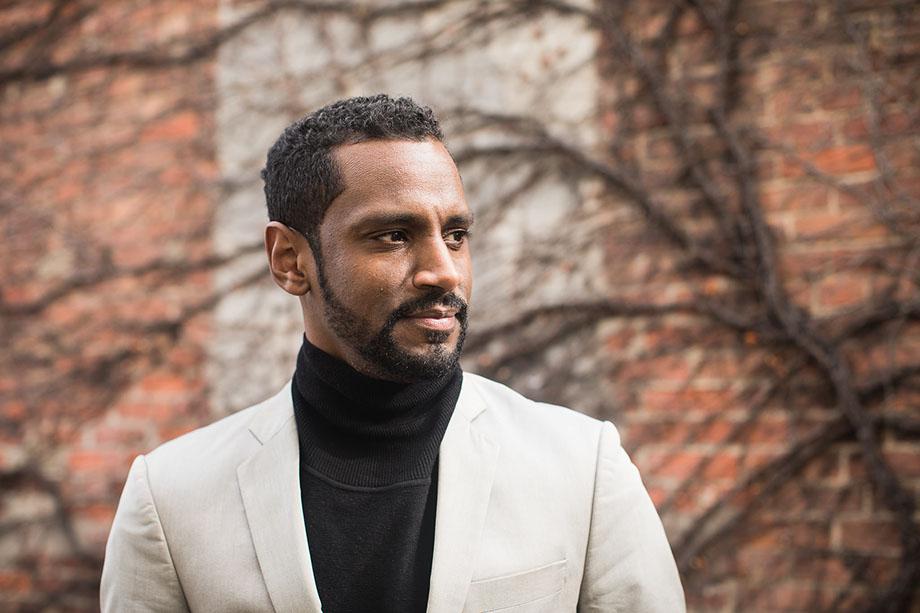Simon’s “Requiem for the Enslaved” has powerful live debut at Gardner Museum

Carlos Simon’s Requiem for the Enslaved was performed in its live premiere by the composer with Hub New Music Sunday at the Isabella Gardner Museum.
The archives at Georgetown University have only a single mention of a slave named Isaac. After his wife and children had been sold to various Louisiana plantations, he decided to run away rather than face a continued life in chains.
His memory provides the thrust of Carlos Simon’s Requiem for the Enslaved, an urgent musical memorial to the 272 slaves sold by Jesuit priests in 1838 to secure the college’s financial future. The ruined lives remain a troubling chapter in the institution’s—and indeed America’s—history. And Simon’s score, heard in its first live performance at the Iabella Gardner Museum’s Calderwood Hall on Sunday afternoon, lays bare the event’s inhumanity.
Premiered virtually at the Library of Congress last November and released on disc this past summer, this work for chamber ensemble and speaker conveys palpable tension through a heady mix of hip-hop, jazz, the avant-garde, and the sounds of the African-American church. In Sunday’s performance, Hub New Music, trumpeter Jared Bailey, rapper Marco Pavé, and pianist Simon revealed its raw power.
The 45-minute score rages over the theme of chattel slavery, and the Catholic mass serves as a subtle framework for Simon to weave a soundscape that channels understandable resentment. The composer has long blended musical styles with a social justice message. Jazz plays a vital role in the Requiem, yet in a deeply symbolic way. Bailey’s virtuosic flourishes and smooth tone recall both Freddie Hubbard and Miles Davis, whose black consciousness was vocal and unapologetic. His vibrant sound brought palpable gravity to the voiceover that speaks the names of Isaac and his children at the work’s opening.
But there are no calls for reconciliation. Pavé’s lyrics, derived from writings by Frederick Douglass and Sojourner Truth, serve as a reminder that the consequences of past actions are felt in the present. “This is not a world created by God, this is a country created by mobs,” he raps with an intensity familiar to fans of Kendrick Lamar. On Sunday, his lines rang like a fiery sermon.
But like the Baptist theology of Simon’s upbringing, text and music eventually relay solace in the promise of heavenly bliss. Quotations of “When the Saints Go Marching In” and “Swing Low, Sweet Chariot,” which haunt the score, reveal both reflection and exuberance.
The ensemble of flute, clarinet, violin, and cello offers vigorous response, recalling the sweep of Antonín Dvořák and and bluesy swagger of William Grant Still. Trumpet and piano then riff on the familiar strains with New Orleans-style zeal.
The musicians rendered it all with jam-band energy. Wind and string flourishes combined in dissonant collages in an apt musical response to Pavé’s lyrics. The “Kyrie” and “Gloria” unfolded in jagged rhythms, with gestures that took on powerful groove.
The closing movements conveyed a yearning from earthly turmoil. “In paradisum” featured Pavé in a final message of hope, and Simon’s soft accompaniment suggested the realization of better things to come.
Requiem for the Enslaved pulls no punches on the way to such transcendence, laying blame to systemic injustice while inviting contemplation, even if uncomfortable, over things as they are. Sunday’s audience responded enthusiastically to the performers and Simon’s music. The composer rewarded the applause with a soulful piano improvisation on “Swing Low, Sweet Chariot,” echoing poignant sorrow for the lives nearly lost to history.
The Isabella Stewart Gardner Museum will present pianist Christopher Taylor in Liszt’s transcriptions of Beethoven’s Sixth and Seventh Symphonies 1:30 p.m. Sunday at Calderwood Hall. gardnermuseum.org
Posted in Performances




